5 Best Barbell Bicep Exercises To Pack On Mass

Written by Kyle Ustach | BScEcon
Fact checked by Tyler DiGiovanni, BSBM
 FACT CHECKED
FACT CHECKED
Aside from chest day, is there any day better than arm day? Sure, it's great to bench press, but little can compare to a nice arm pump. The bicep muscles are arguably the most important muscle group for aesthetics, as nothing beats pumped-up bicep muscles bulging out of your tee shirt. One of the best ways to gain size and strength in the biceps is with barbell exercises. Science has shown that free weights are more effective than machines for muscle growth, so barbells are essential, regardless of the muscle group or workout routine. In this article, we will teach you the five best biceps exercises using a barbell, which are all bicep curl variations.
Table of Contents
- 5 Best Bicep Barbell Exercises
- Other Bicep Exercises
- Anatomy of the Biceps
- Programming Tips
5 Best Bicep Barbell Exercises
In this section, we will explain the best biceps exercises to take your bicep workout to the next level and help those arm muscles grow to another level. For all of the exercises, you can use a regular barbell and add weight or a fixed-weight barbell.
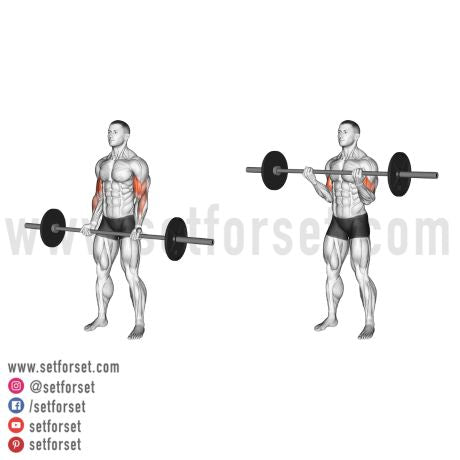
1. Standing Barbell Curl
Just as the squat is the king of leg exercises and bench press is the king of chest exercises, the barbell biceps curl is the king of biceps exercises. The barbell bicep curl is a variation of the classic dumbbell curl, primarily targeting the biceps brachii. It also involves the brachialis, brachioradialis, and various forearm muscles. The forearm muscles include the flexor and extensor muscles to help stabilize the wrist and maintain a strong grip.
Instructions:
- Stand tall with your feet shoulder-width apart.
- Grab the barbell with an underhand (palms facing out) grip, hands slightly wider than shoulder-width apart. Keep your arms straightened so the barbell hangs near your thighs.
- To help keep the body stable, keep your elbows close to your body, shoulder blades pulled back, and core engaged.
- Exhale your breath and slowly curl the barbell upward towards your chest by flexing the elbow. Keep your entire body and upper arms steady, moving only your forearms.
- Squeeze the biceps as much as possible at the top of the lift to feel the contraction. Be sure to maintain control of the weight without using your body for momentum, like by swaying the back.
- Inhale while slowly lowering the barbell back down to the starting position. Focus on the stretch of this negative portion of the lift as well. Ensure you fully extend your arms to get the maximum range of motion.
- Repeat for reps anywhere in the five to twelve range.
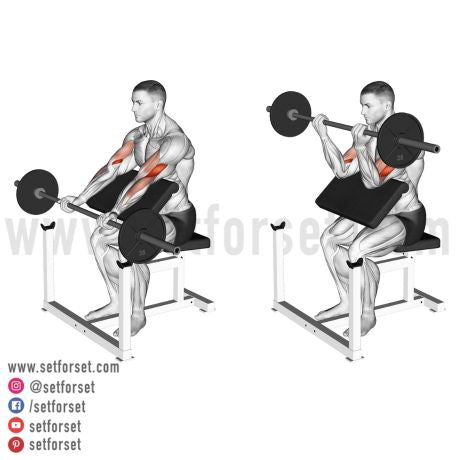
2. Barbell Preacher Curl
Another excellent barbell biceps exercise is the barbell preacher curl. The barbell preacher curl primarily targets the biceps brachii, with secondary work to the brachialis, brachioradialis, and forearm muscles. The exercise requires a preacher bench, or you can create one using an incline bench.
Instructions:
- Adjust the preacher bench so your body fits, so your chest is pushed against the top of the pad, and your triceps are firmly placed on the angled pad.
- While sitting (or kneeling), grab the barbell with an underhand or supinated grip and hands slightly wider than shoulder-width apart. Your arms should be fully extended.
- Exhale and slowly curl the weight toward your forehead by flexing your elbows. Focus on squeezing the muscle at the top of the contraction. Keep your upper arms still, and only use your forearms during the lift.
- Keep your shoulders pulled back, core tight, and elbows planted against the pad throughout the motion.
- Inhale and slowly lower the weight as far as possible without locking out our elbows. Focus on feeling the negative portion while you lower the barbell.
- Repeat for desired reps.
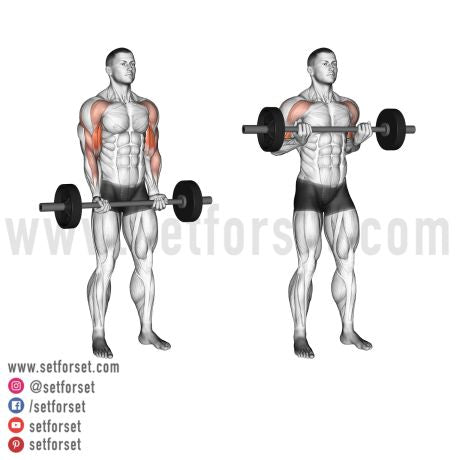
3. Barbell Drag Curl
The barbell drag curl is a lesser-known movement than the standard or preacher curl, but it is just as effective at building biceps muscle. The barbell drag curl is a variation of the straight barbell curl, where the barbell is dragged along the torso rather than being curled upward in a linear motion like a normal barbell curl. Even though it is a shorter range of motion, it removes momentum from other muscles like the shoulders to place more time under tension on the biceps. It also primarily targets the biceps brachii, with secondary work to the brachialis, brachioradialis, and forearm muscles.
Instructions:
- Stand tall with your feet shoulder-width apart.
-
Grab the barbell with a supinated grip, with your hands against your upper thighs, slightly closer than a regular curl. Keep your arms straightened so the barbell hangs near your thighs.
- You can also use an overhand grip, but underhand is the standard and more comfortable.
- Keep your elbows close to your body, shoulders pulled back, and core engaged to help keep the body stable.
- Exhale and slowly start the curl by flexing your elbows and dragging the barbell along your torso upwards toward your shoulders. The bar should be touching your body throughout.
- Squeeze the biceps at the top of the curl to feel the contraction. The lift should be controlled, so avoid swinging the body or other movements to generate momentum.
- Inhale and slowly lower the barbell to the starting position. During the negative portion, focus on keeping the tension in the biceps.
- Repeat for desired reps.
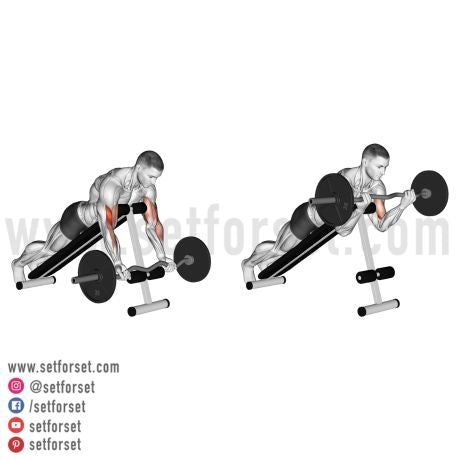
4. Barbell Spider Curl:
Another great barbell biceps exercise is the barbell spider curl, a unique variation with a preacher-like movement. Like all the other curl variations, spider curls primarily work the biceps, with accessory work to the brachialis, brachioradialis, and forearm muscles. The angle of the body allows for a greater range of motion and creates shoulder flexion. Exercises like this with shoulder flexion put more emphasis on the short head of the biceps. The shoulder flexion puts the long head in a disadvantageous position, so the short head takes the bulk of the lift.
Instructions:
- Set up an incline bench to either 30 or 45 degrees.
- Stand so that you are facing the inclined bench, with one foot on each side of the seat on the bench. Lean forward so that your chest is against the inclined padded bench.
- Have someone hand you the barbell, or take your set-up position holding the barbell with an underhand grip, hands slightly outside your shoulders. Your arms should be fully extended straight down so that the barbell is below your shoulders, but keep a slight bend in the elbows to avoid locking them out.
- Keep your chest against the bench pad at all times and your feet flat on the floor. Exhale and slowly curl the bar upwards towards your shoulders by flexing the elbow. Make sure you keep your elbows and triceps against the pad throughout.
- Squeeze the biceps at the top of the curl to get the maximum muscle contraction.
- Inhale and slowly lower the barbell back down to the starting position, but avoid locking out your elbows. Focus on the biceps time under tension as you slowly lower the bar.
- Repeat for reps.
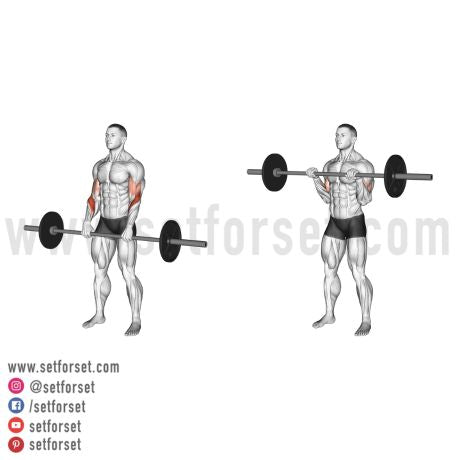
5. Reverse Barbell Curl:
The reverse barbell curl is a bicep curl variation where you use a reverse grip so that your palms are facing the ground while performing barbell curls. The barbell reverse curl primarily targets the brachioradialis, which is technically not part of the biceps muscles but is important for building biceps strength. It also works the biceps, the brachialis, and other forearm muscles secondarily. This exercise should be done towards the end of the biceps workout, after the straight barbell curl and other bicep exercises, since it primarily focuses on the forearms. If your forearms and brachioradialis are pre-exhausted, your biceps training will suffer because they will give out, even though you have the biceps strength.
Instructions:
- Stand tall with your feet shoulder-width apart.
- Grab the barbell with an underhand grip, with your hands in line with your feet and shoulders. Keep your arms straightened so the barbell hangs near your thighs.
- Keep your elbows tight next to your body, shoulder back, and core engaged.
- Exhale and curl the barbell upward towards your shoulders by flexing the elbow. Focus on squeezing the brachioradialis to lift the weight.
- Just like a normal biceps curl, maintain control of the weight without using your body.
- Inhale and slowly lower the barbell back down to the starting position. Fully extend your elbows without locking them.
- Repeat for reps.
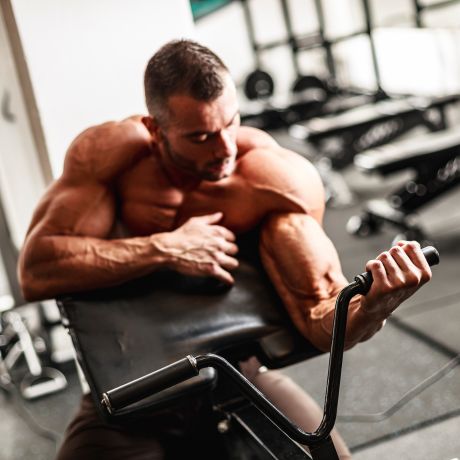
Other Biceps Exercises
The five barbell bicep exercises above should be the staple of all biceps workouts, but it's important to use isolation exercises to maximize biceps muscle growth.
Some great bicep isolation exercises include:
- Dumbbell curl
- Rope hammer curl
- Dumbbell hammer curl
- Dumbbell preacher curl
- EZ Bar bicep curl
- Incline dumbbell curl
- Concentration curl
- Cheat curl
Isolation bicep exercises should be performed at the end of the workout as a way to target a specific head of the biceps, upper arms, or forearms, especially if you are doing a complete arm workout (rather than just biceps). These types of bicep exercises should be done at a higher repetition range, ideally in the ten to fifteen range, using a moderate weight that can be completed in a controlled manner with a full range of motion.
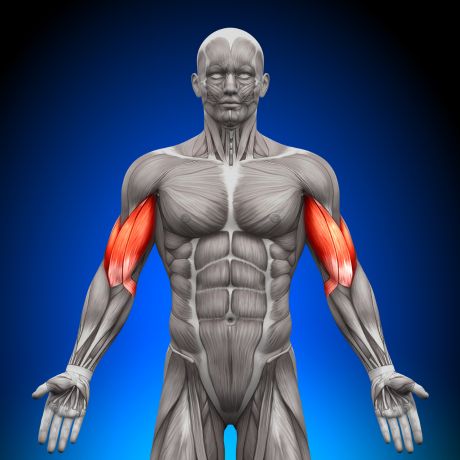
Anatomy of the Biceps
The biceps brachii is one of the two main muscles of the upper arm along with the triceps. The origin of the word is derived from the Latin words "bi" and "ceps," which means "two heads." This is because there are two biceps heads, the long head and the short head.
- Long head - The long head of the biceps starts from the supraglenoid tubercle of the scapula (shoulder blade), which is just above the shoulder joint. The long head is the top portion of the biceps that someone might touch as you flex or the peak of the muscle.
- Short head - The short head of the biceps starts from the coracoid process of the shoulder blade, which is on the front of the scapula close to the shoulder joint. The short head is the portion you see below the long head, which runs in towards the armpit.
The two heads combine to form the biceps brachii, connecting the upper arm to the radius bone on the forearm.
Functions:
- Elbow flexion: The main purpose of the biceps is literally flexing…of the elbow joint. The bicep's primary function is flexion of the elbow joint to allow the hands to move closer to the shoulders.
- Forearm rotation: The biceps also assist in the rotation of the palm upward or forward, which is called forearm supination.
- Stabilizer: The last primary purpose of the biceps is to stabilize the shoulder joint. This mainly applies to the long head of the biceps because it starts at the scapula. Stabilization is especially important for overhead movements or lifting heavy items.
Accessory Muscles
Every exercise that targets the biceps also involves the brachialis and brachioradialis because these muscles work in unison with the biceps during elbow flexion. Although they aren't technically part of the same muscle group, they are closely related.
- Brachialis: The brachialis, a muscle under the biceps, is the strongest elbow flexor. It starts at the bottom of the humerus (upper arm bone) and connects to the ulna bone of the forearm.
- Brachioradialis: The brachioradialis is the long muscle on the lateral (outer) side of the forearms that helps flex the elbow, especially from a semi-pronated or neutral grip. You can see this muscle flexed during any curling exercise.
Forearm muscles are divided into two categories:
- Anterior forearm flexors
- Posterior forearm extensors
Forearm flexors are on the palm side (anterior) of the arm and help to flex the wrist and fingers, as well as forearm pronation. The forearm extensors are on the back of the forearm (posterior) and help to extend the wrist and fingers, as well as forearm supination. All of these forearm muscles play a key role in maintaining grip strength and stabilizing the wrists during the barbell curl and other curl variations.
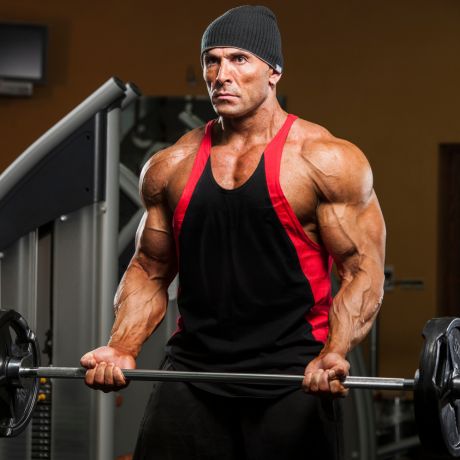
Programming Tips
- Barbell exercises first: Research has shown that training large muscle groups with compound movements is more effective first, then progressing to smaller muscles.¹ An example is training the forearms last after your biceps workout. This is also why you should do barbell exercises first, then progress to machines or isolation movements, like the dumbbell curl. You want your muscles to be fresh for the most important exercises.
- Form > Weight: While true for any muscle group, it's especially important when training biceps to focus on form rather than heavy weights. You will make significantly better progress if you use lighter weights with a full range of motion in a controlled manner rather than using heavier weights with bad form. The biceps are small muscles; they don't need extreme resistance to grow.
- Hand position: Hand positioning is crucial when training any muscle group, especially for a bicep exercise. Studies have shown significantly more muscular activity of the brachioradialis during elbow flexion with an overhand (pronated) grip compared to a neutral or underhand (supinated) grip.² Any bicep curl with an overhand (pronated) grip primarily works the short head, while underhand targets the long head of the biceps. Exercises like the hammer curl that utilize a neutral grip (palms facing each other) primarily hit the brachialis.
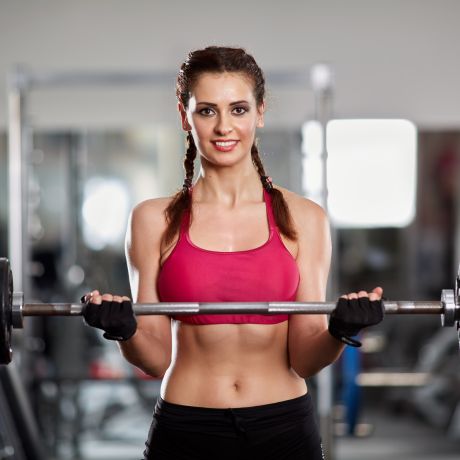
Outro
Biceps training is essential for building arm muscles and overall upper-body development. Depending on your routine split, you likely do the bicep workout as part of an arm workout or upper body day. Regardless of when you train, your bicep workout should be centered around the barbell curl and other barbell workouts. Some of the most effective biceps exercises include the barbell curl, preacher curl, drag curl, spider curl, and reverse barbell curl.
If you want bigger biceps, add these exercises to your biceps workout and perform the compound barbell lifts first, then isolation exercises at the end to sculpt lacking areas of the upper arms. Focus on having perfect form with a full range of motion where you can squeeze the contraction as much as possible rather than ego lifting with bad form. Lastly, pay attention to your hand positions and change them occasionally to build a complete bicep muscle.
References
-
Sheikholeslami-Vatani, Dariush, et al. "Comparison of the Effects of Resistance Exercise Orders on Number of Repetitions, Serum IGF-1, Testosterone and Cortisol Levels in Normal-Weight and Obese Men." Asian Journal of Sports Medicine, vol. 7, no. 1, 1 Mar. 2016, https://doi.org/10.5812/asjsm.30503.
-
Kleiber, Tim, et al. “Muscular Coordination of Biceps Brachii and Brachioradialis in Elbow Flexion with Respect to Hand Position.” Frontiers in Physiology, vol. 6, 6 Aug. 2015, www.ncbi.nlm.nih.gov/pmc/articles/PMC4526813/, https://doi.org/10.3389/fphys.2015.00215.

Also in Blog
About Us
At SET FOR SET, we strive to equip you with the tools and knowledge needed for your fitness journey. Our team of experts, including certified trainers, dietitians, and athletes, brings over a decade of industry expertise. Our goal is to be your primary resource for all fitness inquiries, guiding you toward a stronger and healthier life. Sign up to stay up-to-date!
Recent Articles
-
New Research Reveals The BEST Progressive Overload MethodApril 02, 2024
-
8 Reasons Why You Look Like You Don't LiftApril 01, 2024
-
Jake Gyllenhaal's Roadhouse Workout: How He Got RippedMarch 27, 2024
Must Reads
-
The Best Upper Lower Workout Plans (2, 3, 4, & 5 Day Splits)October 03, 2023
-
The Ultimate "Bro Split" Workout Plan (Backed By Science)August 05, 2023
-
The Ultimate Push Pull Legs (PPL) Workout Split RoutineAugust 03, 2023
EXERCISES
- Best Quad Exercises
- Best Hamstring Exercises
- Best Glute Exercises
- Best Calf Exercises
- Best Upper Chest Exercises
- Best Lower Chest Exercises
- Best Front Delt Exercises
- Best Side Delt Exercises
- Best Rear Delt Exercises
- Best Triceps Exercises
- Best Biceps Exercises
- Best Forearm Exercises
- Best Lat Exercises
- Best Trap Exercises
- Best Upper Back Exercises
- Best Mid Back Exercises
- Best Lower Back Exercises
- Best Ab Exercises
- Best Oblique Exercises
DUMBBELLS
- Dumbbell Chest Exercises
- Dumbbell Shoulder Exercises
- Dumbbell Arm Exercises
- Dumbbell Biceps Exercises
- Dumbbell Triceps Exercises
- Dumbbell Forearm Exercises
- Dumbbell Leg Exercises
- Dumbbell Quad Exercises
- Dumbbell Hamstring Exercises
- Dumbbell Glute Exercises
- Dumbbell Calf Exercises
- Dumbbell Back Exercises
- Dumbbell Lat Exercises
- Dumbbell Trap Exercises
- Dumbbell Full-Body Exercises
- Best Weight Benches for Home Gyms
- Best Dumbbell Racks
- Best Dumbbell Sets
- Best Adjustable Dumbbells
BARBELL
- Barbell Squat
- Barbell Deadlift
- Barbell Bench Press
- Barbell OHP
- Barbell Bent Over Row
- Barbell Front Squat
- Barbell Curls
- Barbell Leg Exercises
- Barbell Chest Exercises
- Barbell Back Exercises
- Barbell Shoulder Exercises
- Barbell Biceps Exercises
- Barbell Triceps Exercises
- Best Barbell Exercises
- Best Landmine Exercises
- Best Power Racks
- Best Bumper Plates
- Best Barbells
- Barbell Weight & Size Guide
BODYWEIGHT
CABLE MACHINE
SMITH MACHINE
ALTERNATIVES
- Deadlift Alternatives
- Leg Press Alternatives
- Hip Thrust Alternatives
- Leg Curl Alternatives
- Leg Extension Alternatives
- Hack Squat Alternatives
- Lunge Alternatives
- Bench Press Alternatives
- Dip Alternatives
- Cable Crossover Alternatives
- Pull Up Alternatives
- Lat Pulldown Alternatives
- T-Bar Row Alternatives
- Upright Row Alternatives
- Seated Cable Row Alternatives
- Face Pull Alternatives
- Hyperextension Alternatives
STRETCHES
MEAL PLANS
- High Protein Meal Plan
- Weight Loss Meal Plan
- Muscle Building Meal Plan
- 16/8 Fasting Meal Plan
- Vegan Bodybuilding Meal Plan
- Carb Cycling Meal Plan
- Keto Bodybuilding Meal Plan
- Carnivore Meal Plan
- Whole30 Meal Plan
- Vertical Diet Plan
- Metabolic Confusion Diet Plan
- Cutting Workout & Diet Plan
- Clean Bulk Workout & Diet Plan
- Slim Thick Workout & Diet Plan
- Blog
- About Us
- Apparel
- FAQ
- Shipping
- Warranty
- Contact Us
- Terms & Conditions
- Privacy Policy
- Affiliates
- SFS UGC Policy
- SFS MBG Policy
- Disclosures
- Legal Disclaimer
Sign up to get the latest on sales, new releases and more…
© 2024
SET FOR SET.
Powered by Shopify











Kyle Ustach
Author